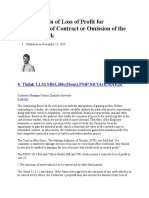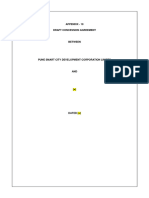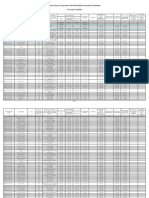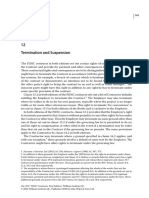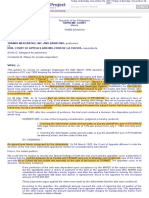Performance Certificate
Performance Certificate
Uploaded by
research-jrCopyright:
Available Formats
Performance Certificate
Performance Certificate
Uploaded by
research-jrCopyright
Available Formats
Share this document
Did you find this document useful?
Is this content inappropriate?
Copyright:
Available Formats
Performance Certificate
Performance Certificate
Uploaded by
research-jrCopyright:
Available Formats
Performance Certificate
Performance Certificate is the certificate issued under sub-clause 11.9 of the FIDIC contract
to constitute acceptance of the Works by the Engineer. This will enable the Contractor to
submit to the Engineer within 56 days, a draft final statement with supporting documents.
When the Engineer verifies the statement, the Contractor will issue a final statement (sub-
clause 14.11) and a discharge for full and final settlement (sub-clause 14.8). In addition,
insurance coverage will no longer be required to be maintained by the Contractor (sub-clause
18.2).
The Engineer will issue the Performance Certificate within 28 days after the latest of the
expiry dates of the Defects Notification Period or as soon as the Contractor has completed
and tested all the Works, including remedying any defects. The Defects Notification Period is
the period for notifying defects and/or damage in the works or a section or a part (as the case
may be) under sub-clause 11.1 [Completion of Outstanding Work and Remedying Defects],
as stated in the contract data (if not stated, one year), and as may be extended under sub-
clause 11.3 [Extension of Defects Notification Period]. This period is calculated from the
Date of Completion of the works or section or part.
The Defects Notification Period starts when the Engineer issues the Taking Over Certificate
if works are completed according to the contract. The Contractor may submit a notice to the
Engineer no earlier than 14 days before expected completion or requesting take over (sub-
clause 10.1).1
11.9 Performance Certificate.
The Performance Certificate provides written confirmation that the Engineer has completed
his obligations and this document constitutes “acceptance of the Works.”
The definition of Performance Certificate at Sub-Clause 1.1.3.8 is singularly unhelpful. It
defines the Performance Certificate as follows: “Performance Certificate” means the
certificate issued under Sub-Clause 11.9 [Performance Certificate].”
The Performance Certificate is important in that it is linked to the Employer’s obligation to
return the Performance Security within 21 days after receiving the Performance Certificate
(Sub-Clause 4.2). It is also linked to the Contractor’s right of access to the Site (Sub-Clause
11.7), the obligation on the Contractor to issue the draft final statement (Sub-Clause 14.11),
and some of the Contractor’s insurance obligations (Sub-Clauses 18.2 and 18.3).
The Performance Certificate should be issued within 28 days after the latest of the expiry
dates of the Defects Notification Periods or as soon thereafter as the Contractor: (1) has
supplied all the Contractor’s Documents; (2) completed and tested all the Works; and/or (3)
remedied any defects.
It should be noted that under Sub-Clause 11.3 the Defects Notification Period shall not be
extended by more than two years. Sub-Clause 11.3 was included to prevent an Employer
from indefinitely extending the Defects Notification Period and thereby preventing the issue
of a Performance Certificate.
Robert Knutson16 raises the interesting question of whether under English law the issuing of
this Certificate is final and conclusive as to the Contractor’s satisfactory performance of the
Contract and thus stops the Employer from subsequently alleging that the work was
defective. He states that there is a line of English authorities on different forms of Contract
1
https://pmweb.com/ensure-issuing-performance-certificate-construction-contracts-accordance-relevant-
contract-clauses/
and arbitral decisions in international contracts to this effect and that the FIDIC language
found here allows such arguments to be made, although their efficacy may be tempered by
Sub-Clause 11.10. In Matthew Hall Ortech Ltd v Tarmac Roadstone Ltd17 the court had to
consider whether the Final Certificate issued under an IChemE Red Book was conclusive
evidence that the works had been completed in accordance with the contract. The court held
that it was. However, the contract stated that the Final Certificate was “conclusive
evidence ... that the Contractor had completed the Works and made good all defects.” The
wording under Sub-Clause 11.9 is substantially different.
The alternative view is that there is nothing within the Performance Certificate that indicates
that it is intended to be conclusive evidence of the facts certified. Without such a clear
statement the Performance Certificate does not become final and conclusive. In AG v Wang
Chong Construction Co Ltd18 the Hong Kong Court of Appeal stated that if the parties to a
contract intended the completion certificate to be final and conclusive such that an employer
would be left without a remedy even for latent defects of a very serious nature, the certificate
would have to set out in the clearest possible terms that this was what was intended.
Similarly, Lord Diplock in Gilbert-Ash (Northern) Ltd v Modern Engineering (Bristol) Ltd19
stated:
“So when one is concerned with a building contract one starts with the presumption
that each party is to be entitled to all those remedies for its breach as would arise by
operation of law …To rebut that presumption one must be able to find in the contract
clear unequivocal words in which the parties have expressed their agreement that this
remedy shall not be available in respect of breaches of that particular contract.”
You might also like
- Public Procurement Act 2006 EnglishDocument93 pagesPublic Procurement Act 2006 EnglishSaadman SakibNo ratings yet
- DISPUTE BOARD’s DECISION on The second Dispute arising out of the Contract for the Rehabilitation of M3 Chisinau — Giurgiulesti Road (km 151+200 - km171+290 and km 179+650 - km190+750) Contract RSPSP/W4/04Document20 pagesDISPUTE BOARD’s DECISION on The second Dispute arising out of the Contract for the Rehabilitation of M3 Chisinau — Giurgiulesti Road (km 151+200 - km171+290 and km 179+650 - km190+750) Contract RSPSP/W4/04Eugen Luchianiuc100% (1)
- Compensation of Loss of Profit For Termination of Contract or Omission of The Scope of WorkDocument3 pagesCompensation of Loss of Profit For Termination of Contract or Omission of The Scope of WorkAnonymous 94TBTBRksNo ratings yet
- Technical Specification Section 704 - Precast Concrete KerbDocument1 pageTechnical Specification Section 704 - Precast Concrete KerbRock AmjathNo ratings yet
- Reviewer Property San Beda PDFDocument27 pagesReviewer Property San Beda PDFSheena Valenzuela100% (2)
- 9 Corbett UK - Clause-9 - Article - Tests On CompletionDocument1 page9 Corbett UK - Clause-9 - Article - Tests On CompletionHaniNo ratings yet
- Presentation On Price Adjustment & Concept of Cost & Time Compensation in FIDIC Red Book 1987Document16 pagesPresentation On Price Adjustment & Concept of Cost & Time Compensation in FIDIC Red Book 1987hannykhawaja0% (1)
- 1 - Procurement - EDCF ProceduresDocument2 pages1 - Procurement - EDCF ProceduresKamal AkzNo ratings yet
- Fidic User Guide Final (Romania) PDFDocument164 pagesFidic User Guide Final (Romania) PDFArshad MahmoodNo ratings yet
- Claim Number 13Document90 pagesClaim Number 13Eyob MitekuNo ratings yet
- Cambodia PPP Development - Mr. Vuthika HangDocument10 pagesCambodia PPP Development - Mr. Vuthika HangRitik Maheshwari100% (1)
- Clause 19: Event or Circumstance. Thus An Event or Circumstance, Which Otherwise Meets TheDocument22 pagesClause 19: Event or Circumstance. Thus An Event or Circumstance, Which Otherwise Meets TheBlen tesfayeNo ratings yet
- 03 Prebid Consortium Agreement Con 1Document13 pages03 Prebid Consortium Agreement Con 1Rudrani ChowdhuryNo ratings yet
- Contract Data Fidic MDB 2010 Const2Document2 pagesContract Data Fidic MDB 2010 Const2muslih_mhdNo ratings yet
- Framework Agreement On Work-Related StressDocument97 pagesFramework Agreement On Work-Related StressJoaquín Vicente Ramos RodríguezNo ratings yet
- Table of FIDIC CasesDocument75 pagesTable of FIDIC CasesNuki JalalishviliNo ratings yet
- Request For Information FormatDocument2 pagesRequest For Information FormatDawit SolomonNo ratings yet
- SC Draft Concession Agreement (O&M)Document46 pagesSC Draft Concession Agreement (O&M)Geo Designs researchNo ratings yet
- Pune Ring Road - PKG PRR - w1 & 2Document106 pagesPune Ring Road - PKG PRR - w1 & 2Debashis SarkarNo ratings yet
- Progress Measurement and Earned Value Aace International: ProductivityDocument1 pageProgress Measurement and Earned Value Aace International: ProductivitySucher EolasNo ratings yet
- Act 416 Tolls Roads and Bridges Act 1965Document8 pagesAct 416 Tolls Roads and Bridges Act 1965Adam Haida & CoNo ratings yet
- RFP - BESS - 619dd2596b9b9Document131 pagesRFP - BESS - 619dd2596b9b9Imran BabarNo ratings yet
- Contract Data For Programme 1998 National Phare Programme For RomaniaDocument9 pagesContract Data For Programme 1998 National Phare Programme For RomaniaRadu BilbaNo ratings yet
- Tripartite Agreement (Builder Subvention Facilities)Document6 pagesTripartite Agreement (Builder Subvention Facilities)Harsh GuptaNo ratings yet
- Fidic YellowDocument151 pagesFidic YellowLaetitia Nicolescu100% (1)
- Icc Force Majeure NewDocument15 pagesIcc Force Majeure NewNikhil SinghNo ratings yet
- Techno Legal Aspect of FIDICDocument14 pagesTechno Legal Aspect of FIDICShivangi BajpaiNo ratings yet
- 1 Practical Completion CertDocument3 pages1 Practical Completion CertJenny Dimaculangan100% (1)
- Fidic Yellow Book Particular ConditionsDocument9 pagesFidic Yellow Book Particular ConditionsKENNYNo ratings yet
- BMP Project-Implementation-Manual (V 1 1) PDFDocument131 pagesBMP Project-Implementation-Manual (V 1 1) PDFLiseth StylesNo ratings yet
- Road Safety Audit GuideDocument14 pagesRoad Safety Audit GuideDIPANKARNo ratings yet
- Construction Case 2016Document21 pagesConstruction Case 2016Rock AmjathNo ratings yet
- Eskom Facility Performance GuaranteesDocument5 pagesEskom Facility Performance GuaranteesOribuyaku DamiNo ratings yet
- Payment On A Lump Sum BasisDocument8 pagesPayment On A Lump Sum Basisbrene88100% (2)
- World Bank PQandUsersGuide19Sep2011-Rev1Document121 pagesWorld Bank PQandUsersGuide19Sep2011-Rev1Anonymous ciKyr0tNo ratings yet
- 2015 Jurisdiction ChallengesDocument38 pages2015 Jurisdiction Challengesfaaderinto5964No ratings yet
- Barr Grutters 2015 Fidic Quick Reference Guide Pink BookDocument121 pagesBarr Grutters 2015 Fidic Quick Reference Guide Pink Bookquenti.chevrier100% (1)
- Contents of Tender DocumentsDocument1 pageContents of Tender DocumentsMligo ClemenceNo ratings yet
- Case Study BDocument7 pagesCase Study BGwapito TresNo ratings yet
- Project Appraisal Document THCRPDocument88 pagesProject Appraisal Document THCRPsayedwafiullahNo ratings yet
- Company Name Div: Elec/Mech/Civil/ Interior: Internal Approval For Material SubmittalDocument6 pagesCompany Name Div: Elec/Mech/Civil/ Interior: Internal Approval For Material SubmittalKumlachew MengistuNo ratings yet
- QS Letters GuideDocument4 pagesQS Letters GuideZahoor Ahmed MohsanNo ratings yet
- Notices and Permits NairobiDocument6 pagesNotices and Permits NairobiLevisNo ratings yet
- Light at The End of The Tunnel? Gibraltar Dispute Reviews Key Fidic Yellow Book ProvisionsDocument15 pagesLight at The End of The Tunnel? Gibraltar Dispute Reviews Key Fidic Yellow Book ProvisionsPriyank KulshreshthaNo ratings yet
- 1835 Lesser Wallach 12 Deadly SinsDocument11 pages1835 Lesser Wallach 12 Deadly SinsIrina CraciunNo ratings yet
- Time of ConcentrationDocument29 pagesTime of ConcentrationmeylancoolNo ratings yet
- Flexible Pavement ProjectDocument55 pagesFlexible Pavement ProjectRamsharan RayNo ratings yet
- International Construction Contract Law - 2014 - Klee - Appendix B Sample LettersDocument19 pagesInternational Construction Contract Law - 2014 - Klee - Appendix B Sample LettersAhmed El-wahshNo ratings yet
- Short Form of Contract TTIADocument22 pagesShort Form of Contract TTIAworkspace.1099No ratings yet
- Payments On Account in Respect of Disputed SumsDocument3 pagesPayments On Account in Respect of Disputed Sumsmarx0506No ratings yet
- Mining (Misc) - Model Form Mining Services Contract Alternative Clauses (v2) (AMPLA 2006) enDocument23 pagesMining (Misc) - Model Form Mining Services Contract Alternative Clauses (v2) (AMPLA 2006) enkawtarNo ratings yet
- FIDIC Construction Contracts and Arbitration - The Role of Dispute Adjudication Boards and The Importance of Governing Law - Kluwer Arbitration BlogDocument4 pagesFIDIC Construction Contracts and Arbitration - The Role of Dispute Adjudication Boards and The Importance of Governing Law - Kluwer Arbitration BlogpieremicheleNo ratings yet
- Mitsui Construction Co LTD V A-G of Hong Kon (Overview)Document4 pagesMitsui Construction Co LTD V A-G of Hong Kon (Overview)Mazuan LinNo ratings yet
- Master Framework AgreementDocument195 pagesMaster Framework Agreementtimbittim97No ratings yet
- Over Head CostDocument8 pagesOver Head CostHabtamu DesalegnNo ratings yet
- 12 Termination and Suspension: The 2017 FIDIC ContractsDocument19 pages12 Termination and Suspension: The 2017 FIDIC ContractsteedNo ratings yet
- PRB Fitness For PurposeDocument3 pagesPRB Fitness For PurposePedro Montenegro AlarcónNo ratings yet
- Liquefaction Triggering Assessment of Gravelly Sand State-Of-Art Review ReportDocument27 pagesLiquefaction Triggering Assessment of Gravelly Sand State-Of-Art Review ReportSen HuNo ratings yet
- Fidic Part 12Document5 pagesFidic Part 12venki_2k2inNo ratings yet
- Contract ManagementDocument10 pagesContract Managementmartin.bullNo ratings yet
- Clause 11 PDFDocument14 pagesClause 11 PDFZvonimir SalkićNo ratings yet
- Rolling Stone FilingDocument19 pagesRolling Stone FilingTHROnlineNo ratings yet
- Team Roster PDFDocument1 pageTeam Roster PDFBurroninja3No ratings yet
- Be It Enacted by The Senate and The House of Representatives of The Philippines in Congress AssembledDocument2 pagesBe It Enacted by The Senate and The House of Representatives of The Philippines in Congress AssembledCacaCamenforteNo ratings yet
- Secretary's CertificateDocument2 pagesSecretary's CertificateRhyz Taruc-ConsorteNo ratings yet
- Imp BriefDocument10 pagesImp BriefmanikaNo ratings yet
- uMEC Vet - Operator's Manual - V5.0 - ENDocument198 pagesuMEC Vet - Operator's Manual - V5.0 - ENJuanNo ratings yet
- Read - Tramat Mercantile Vs CA G.R. No. 111008Document2 pagesRead - Tramat Mercantile Vs CA G.R. No. 111008JetJuárezNo ratings yet
- Recognition of Foreign DivorceDocument22 pagesRecognition of Foreign DivorceMarren Salvador100% (1)
- Trust ReceiptDocument5 pagesTrust ReceiptMyna Zosette MesiasNo ratings yet
- Assistant Engineer's Training and Assessment Record Book (TARB) Order FormDocument0 pagesAssistant Engineer's Training and Assessment Record Book (TARB) Order FormSubramanian SaravananNo ratings yet
- Rick Berg's Real Estate License Application For Goldmark Property ManagementDocument1 pageRick Berg's Real Estate License Application For Goldmark Property ManagementNorthDakotaWayNo ratings yet
- Application Partition of Joint PropertyDocument14 pagesApplication Partition of Joint PropertyahtshamNo ratings yet
- Heirs of Lourdes Saez Sabanpan Vs Cormoposa GR 152807Document10 pagesHeirs of Lourdes Saez Sabanpan Vs Cormoposa GR 152807Abdul AzizNo ratings yet
- Boston Bank of The Philippines V ManaloDocument31 pagesBoston Bank of The Philippines V ManalopjNo ratings yet
- Registration of NGO Under Societies Registration Act, 1860Document3 pagesRegistration of NGO Under Societies Registration Act, 1860Shah Nasir Ud DinNo ratings yet
- Clean Air Flow TestDocument27 pagesClean Air Flow TestDebabrata TantubaiNo ratings yet
- Void Agreement:: Ab InitioDocument9 pagesVoid Agreement:: Ab InitioPrem Sanghvi100% (1)
- Barringer E3 PPT 12Document36 pagesBarringer E3 PPT 12shahidul0100% (1)
- Rules Governing Transfer of Property in Favour of Unborn PersonDocument12 pagesRules Governing Transfer of Property in Favour of Unborn PersonMeenu Pahal100% (2)
- BP 129 As Amended by RA 7691 On Jurisdiction of RTC and MeTC, MTC MCTCDocument59 pagesBP 129 As Amended by RA 7691 On Jurisdiction of RTC and MeTC, MTC MCTCAraveug Innavoig86% (14)
- Defences To NegligenceDocument4 pagesDefences To Negligencesimon etyNo ratings yet
- STV 8172 ADocument19 pagesSTV 8172 AHenryAmayaLarrealNo ratings yet
- VS Letter To The Vendors Forwarding A Copy of The Duly Executed, Adjudicated and Stamped Deed of Assignment (By Way of Transfer) (With The "Sijil Setem" Attached) For Their Safekeeping.Document2 pagesVS Letter To The Vendors Forwarding A Copy of The Duly Executed, Adjudicated and Stamped Deed of Assignment (By Way of Transfer) (With The "Sijil Setem" Attached) For Their Safekeeping.a179948No ratings yet
- Frazer Mot Convert 7 Vers 1Document20 pagesFrazer Mot Convert 7 Vers 1Erik van EckNo ratings yet
- Asokan Vs Lakshmikutty and Ors 14122007 SCS071375COM472723Document7 pagesAsokan Vs Lakshmikutty and Ors 14122007 SCS071375COM472723namanNo ratings yet
- Agreement With Trainer - 21CSSDocument6 pagesAgreement With Trainer - 21CSSudayNo ratings yet
- Insurance Law ProjectDocument22 pagesInsurance Law ProjectAshish SinghNo ratings yet
- G.R. No. 88268Document2 pagesG.R. No. 88268Kenneth Christopher MirandoNo ratings yet
- #35 Avelino S. Alilin Et Al. Vs Petron Corp G.R. No. 177592, 2014-06-09Document1 page#35 Avelino S. Alilin Et Al. Vs Petron Corp G.R. No. 177592, 2014-06-09Michael Francis HubahibNo ratings yet


